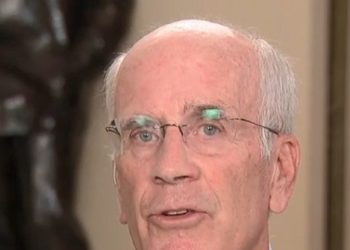A respected network of hospitals and cancer centers is halting enrollment in clinical trials for children with brain cancer after the federal government said it would no longer provide funding to the group.
The Pediatric Brain Tumor Consortium, an association of 16 academic centers and children’s hospitals dedicated to trials of novel treatments for pediatric brain cancer, directed its members last week to stop enrolling new patients because it had been informed that the consortium would not be eligible to apply for funding beyond March 2026, said Dr. Ira Dunkel, a pediatric oncologist who is the chair of the group.
Dr. Dunkel said he had heard about the decision from the program’s liaison at the National Cancer Institute on Aug. 19. He said he had not received written communication from the leadership at the institute — which provides the bulk of funding, about $4 million annually, to the consortium — about the decision. (Dr. Dunkel practices at Memorial Sloan Kettering Cancer Center but was not speaking on its behalf.)
The only explanation Dr. Dunkel has seen, he said, is a paragraph on the institute’s website, which was updated Aug. 21 and states a rationale of optimizing resources for “maximum impact.” The Trump administration has slashed funding for the National Institutes of Health, of which the National Cancer Institute is a part, though it’s not clear whether this decision was connected to those cuts.
The Pediatric Brain Tumor Consortium, which has conducted dozens of trials since it was established in 1999 by the National Cancer Institute, has six active trials; five are related to treatment. These are early phase trials evaluating the safety and efficacy of novel therapies for pediatric brain cancers — mostly “the very highest-risk types” of these cancers, said Dr. John Prensner, a pediatric neuro-oncologist at the University of Michigan, which is not a member of the consortium.
“These are the ones that have very poor outcomes, often in relapsed patients who haven’t responded to prior therapy, and patients for whom the chance of survival is very low,” he said.
Patients who were already enrolled will remain in the studies and will continue to receive treatment, Dr. Dunkel said. But for the time being, patients on waiting lists or those yet to be recruited cannot enroll. That’s because it is unclear if researchers will be able to complete treatment and safety monitoring on new patients over the next seven months.
If they did enroll new patients, “It would seem to be catastrophic to the patient and family to say, ‘I’m sorry, but you can no longer get that treatment because the consortium is ending,’” Dr. Dunkel said.
It’s unclear what will happen to the trials. The program director who oversees the consortium’s work for the National Cancer Institute did not respond to a request for an interview. The U.S. Department of Health and Human Services did not respond to a request for comment.
The early phase trials are designed to test unproven treatments for pediatric brain cancers. Participants number in the tens, rather than in the hundreds — as is the case with more advanced stages of clinical trials. Still, the work has helped answer important questions of whether to continue developing a drug and whether to expand research in a larger trial.
On its website, the National Cancer Institute said that it would “strengthen” the Pediatric Early Phase Clinical Trials Network, a larger consortium that is focused on childhood cancers more broadly. The website said that the institute was “committed to ensuring that ongoing P.B.T.C. trials are completed wherever feasible and appropriate.”
Dr. Dunkel said some studies might close prematurely.
He is exploring the possibility of transferring studies to the Pediatric Early Phase Clinical Trials Network but said it would not “be a seamless transition.” Even in the best case, he said, patients would most likely lose access to the trials for a period of time.
And that larger network doesn’t have the same focus, said Dr. Douglas Hawkins, a pediatric oncologist at Seattle Children’s Hospital and chair of the Children’s Oncology Group.
“The risk is in the end we don’t do as many impactful clinical trials for pediatric brain tumors,” he said.
One of the current trials involved using CAR T-cell therapy, a type of immunotherapy, to treat a subset of children with recurrent or progressive ependymoma, a type of brain cancer. There are currently no effective treatments for these children, said Dr. Meenakshi Hegde, a pediatric oncologist at Texas Children’s Cancer Center and the principal investigator of that study.
The trial had enrolled roughly 20 patients, including some who have not yet received their CAR T cells. Investigators were about to undertake a second phase evaluating surgery in conjunction with the treatment in a half-dozen patients, Dr. Dunkel said.
Another trial that was on the cusp of beginning, after two years of rigorous review, was for a neurosurgical procedure that would use tiny lasers to deliver heat and destroy tumors in the brain, said Dr. Mark Souweidane, director of pediatric neurosurgery at NewYork-Presbyterian Hospital/Weill Cornell Medical Center and Memorial Sloan Kettering Cancer Center.
The trial would have studied whether this type of surgery could deliver comparable results to a traditional surgical procedure, which is more invasive and involves a longer hospital stay.
Though Dr. Souweidane said he might be able to take the trial to other institutions, he bemoaned the loss of a group where physicians and scientists from different disciplines could share ideas.
“The thing that’s intangible, that will never be able to be monitored, is the cross-fertilization, the collaboration, the idea making that happens in these groups,” he said.
Nina Agrawal is a Times health reporter.
The post Pediatric Brain Cancer Trial Group to Be Phased Out appeared first on New York Times.




